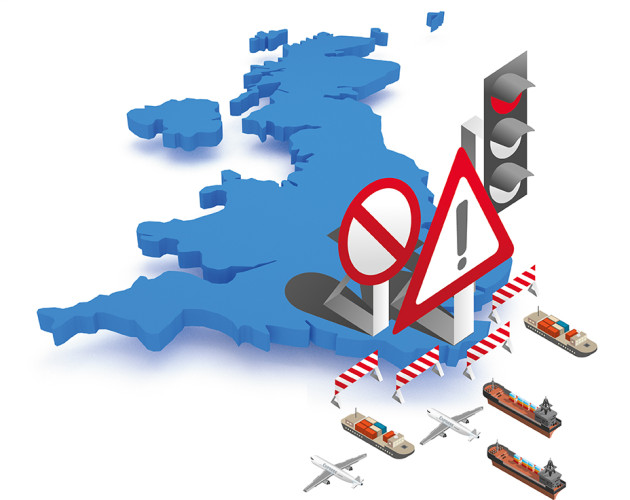
“Frictionless trade”: What the white paper tells us
The government’s new white paper on economic arrangements post-Brexit is the roadmap that many have been waiting for, outlining how the EU’s future relationship with the UK could work after March 19.
So how will it affect trade?
The white paper, released on Friday, proposes a new free trade area for goods via the creation of a new facilitated customs arrangement (FCA).
A new FCA would enable “frictionless trade” by removing “the need for customs checks and controls between the UK and the EU” and avoiding the re-forming of a hard border in Ireland.
How the government wants to achieve this has never been implemented on any significant scale globally before.
It wants to split the collection of tariffs on goods coming into the EU at UK borders.
On the one hand, it would collect tariffs for goods intended for wider movement within the EU on the EU’s behalf.
At the same time, it wants to apply its own tariffs for goods intended for consumption in the UK.
Central to this system is the idea of “trusted traders”.
These are businesses which must “robustly demonstrate” where goods have come from and pay the correct tariffs accordingly: “A UK tariff if it is destined for the UK and the EU tariff if it is destined for the EU.”
However, some have voiced concern about the feasibility of such a scheme.
According to Malcolm Dowden, legal director at law firm Womble Bond Dickinson, these businesses must be able to demonstrate that they have both the policies and physical arrangements required to guarantee that goods have been transported securely and are properly accounted for.
To qualify for the linked status of Authorised Economic Operators (AEO), businesses must currently be able to show at least three years’ experience of meeting customs obligations – a tall order for the estimated 131,000 businesses which, according to HMRC estimates, will be brought into customs procedures for the first time.
“It is possible to buy-in expertise or to use intermediaries such as freight forwarders or distribution companies,” said Dowden.
“However, the UK currently has only 630 businesses with AEO status (compared with 6226 in Germany and 1563 in the Netherlands). Consequently, third party AEO status and expertise is likely to be in short supply, potentially increasing the cost of accessing those services.”
Attaining AEO status is not straightforward, Dowden warned.
Applications require a detailed body of evidence and take up to 120 days in theory.
In some cases it can take up to between 18 months and two years.
Pending approval
There are several sticking points to getting the white paper proposals greenlit in Brussels.
At the heart of the white papers’ plan for a new economic partnership is the UK’s exit from the customs union and the single market, as well as ending the free movement of people.
The terms of the proposed FCA would allow the UK to strike its own trade deals with non-EU countries.
However, Theresa May was widely criticised for her "half-in, half-out" approach at Chequers on July 6.
And as many have pointed out, several of the white paper proposals rely on access to the single market for goods – one of the four freedoms that underpin the single market along with capital, services and people.
“The White Paper proposes a free trade area for goods - but it is very close to single market membership for goods in all but name,” said the BBC’s Chris Morris.
“[The EU] has already said the UK cannot have full access to the single market for goods and not services, especially if is determined to end the free movement of people.”
Sky News’ economics editor, Ed Conway similarly said: “The promise of this scheme is both that the UK can keep the benefits of the customs union (free flow of goods, no hard border in Ireland) without sacrificing the opportunity of agreeing trade deals with other countries, for example, the US.”
Some, like the like the Food and Drink Federation (FDF) have praised the white paper’s commitment to “no-friction trade”, which it called “extremely encouraging”.
However, it also called for urgent clarity for how things will work in practice, including the suggestion of a “common rulebook”, which would mean the UK maintaining the same product standards as the EU.
The government said this would not prevent it from signing deals with other trading partners, although others argue this would hinder future trade deals with countries like the US, which would be forced to conform to EU rules and regulations.
It is largely what led Donald Trump to argue that the proposals, put to ministers for the first time on July 6, would kill a potential US trade deal.
However, the US president seemed to make a U-turn in an interview with Piers Morgan this morning, when he said he will sign a "tremendously big" trade deal with Britain after Brexit.
“No matter what they do, they have a right to get a deal with the US,” he said.
Keywords:
- new
- UK
- US
- EU
- trade
- goods
- single
- free
- businesses
- customs
- paper
- single market
- aeo status
- trade deals
- free movement
- goods intended
- free trade area
- own trade deals
- paper proposals greenlit
- several sticking points
- new economic partnership
- AEO
- FCA





